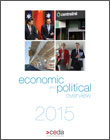Explore our Climate and Energy Hub
24/02/2015
“With the new Federal Liberal Government there’s been a recalibration of the relationship between the Commonwealth, the nation and South Australia,” he said.
“It’s apparent that the Commonwealth through its decision making process is no longer prepared to subsidise the car industry which has been very substantial, underpinning much of not only South Australia’s but the nation’s manufacturing capabilities.”
Mr Weatherill also said there are doubts the Commonwealth Government supports domestic defence manufacturing.
“We’ve also seen doubts emerging now about whether the Commonwealth is committed to a defence sector which has a local industry capability for the nation and that has a particular effect on South Australia,” he said.
On the topic of climate change, Mr Weatherill said Adelaide will become the world’s first carbon neutral city.
“Our commitment to establish a carbon neutral Adelaide green zone will make us the world’s first carbon neutral city,” he said.
“We believe that we can within a decade completely reconfigure the way in which our city operates for the benefit of our citizens but also to project an image of ourself in an incredibly crowded international marketplace.”
Speaking on South Australia’s large uranium deposits, Mr Weatherill said there will be Chinese and Indian demand for nuclear energy.
“If you are serious about tackling climate change in countries like China and India we know that those countries see for themselves a nuclear future,” he said.
“It is right and proper that we ask ourselves what role we play in that international imperative so we’ve established a royal commission to investigate the merit of South Australia’s potential participation in nuclear fuel.”
Also speaking at the event, Australian Council of Social Service (ACOSS) CEO and EPOcontributing author, Cassandra Goldie said the GST is not the only tax reform needed to solve budget issues.
“We are not having a proper, responsible conversation about other parts of the tax system where there is clear leakage…superannuation tax concessions and negative gearing,” she said.
Ms Goldie said tax reform should enable economic growth and address problems such as housing affordability.
“We will continue to express the concern that a straight-up increase in the rate or a broadening of the base of the GST will be inherently regressive,” she said.
“We should also be pursuing tax reform with an eye to how it will contribute positively to some of these important public policy challenges like housing affordability, like participation and of course stimulating in the appropriate way solid investment in real economic activity that will be jobs rich.”
Ms Goldie said blame gaming about budget sustainability problems should be stopped with both sides of politics responsible for structural issues.
“There is no question if you look at the specific policy decisions that have been made in the last decade or so it is a shared structural problem that has been created,” she said.
“If you look at the Howard era, if you look at the Rudd and Gillard era…there have been a series of policies that during the boom era look politically attractive…but this kind of expenditure is not sustainable and it is not delivering on really important core public policy purpose.”
ANZ Banking Group Chief Economist andEPO contributing author, Warren Hogan also discussed tax reform at the event.
“One of the key things we’ve got to do is undertake a serious, substantial tax reform and it’s got to evolve, the GST has got to be part of it in my view,” he said.
“There is no doubt the GST is regressive and it has to be sorted out in terms of its impact.”
On the upcoming Federal Budget, Mr Hogan said it is unlikely the Government will include any major tax reforms.
“This budget you can’t do anything meaningful in terms of changing tax,” he said.
Mr Hogan said the Federal Government does not have the political capital to implement reforms.
“I don’t think they’ve got the political capacity to do what they need to do,” he said.
Discussing reforms and leadership, Mr Hogan said we need vision for Australia’s future.
“There’s too many bits and pieces, adjustments going on, reforms here and there, there’s no overarching strategy, reducing the deficit and contain debt is not a vision,” he said.
“I think one of the failings of the last five to 10 years in Australian politics has been the inability to have complex discussion and far broader leadership in the community to get towards outcomes.”
 CEDA's Economic and Political Overview
CEDA's Economic and Political Overview
CEDA's Economic and Political Overview (EPO) is Australia's premier publication and series of briefings on the Australian economy and politics for the year ahead. Running for more than 30 years, the EPO brings together political, economic and business leaders and provides CEDA members with business intelligence on the environment they will be operating in over the next 12 months.
CEDA's 2015 EPO will provide economic and political forecasts and also examine funding options from the finance sector and some proposed market-based reforms and equity issues in Australia.
Download 2015 EPO publication (pdf)
Find our more about CEDA's EPO or read articles and watch videos from EPO events.
